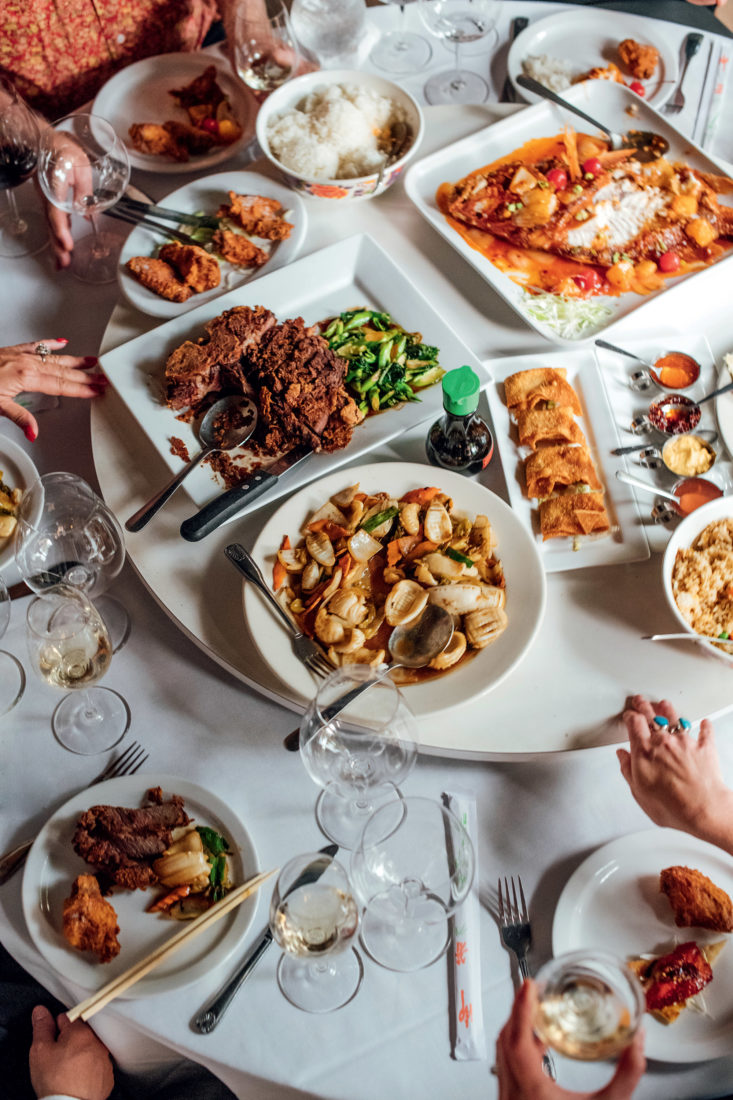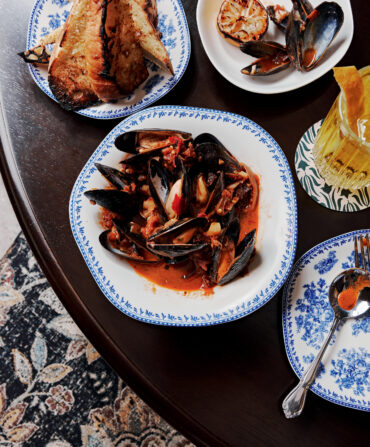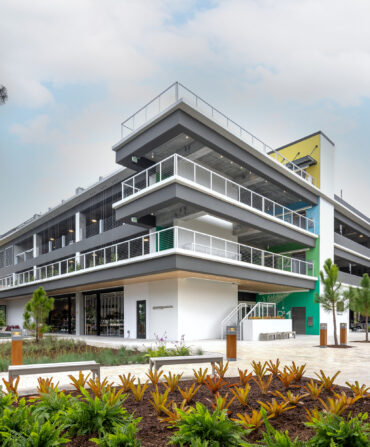Pastilles of roasted duck, smeared with hoisin and capped with crisped skin, presented on scallion pancakes; rounds of squid and leaves of sour cabbage, pooled in a sauce that tastes like a seaweed-citrus distillate; fat steaks, wok-crusted with ginger and jalapeño, sliced off the bone and served with bok choy: Lucky Palace in Bossier City, Louisiana, serves traditional and imagined Chinese dishes.
Hard by I-20, across the Red River from Shreveport, in the shadow of a skyscraping Diamond Jacks casino sign, the Bossier Inn and Suites rents rooms for $195 a week. Inside the stucco one-story, religious tracts scatter the check-in desk. A vending machine stocks Big Texas cinnamon rolls and Vienna sausage pull-top cans. Blinking through a frosted glass window, at the rear of the fluorescent-lit lobby where a coffee shop once stood, a Bud Light sign heralds the Chinese Year of the Snake.
Lucky Palace does business in that onetime coffee shop, flanked by a waterfall feature that has run dry and a bar that looks like it was lifted from an Applebee’s. To cross proprietor Kuan Lim’s threshold is to revisit a scene from The Lion, the Witch and the Wardrobe in which a bold step into the dark yields a kaleidoscope of sights and smells and tastes. Nightly, Lim walks the carpet- and parquet-floored dining room, beaming a wide grin, embracing regulars who dine on pupu platters of skewered chicken and crab Rangoon and drink first-growth Burgundies, talking trophy wine allocations with chefs who flock here on their nights off to eat fried prawns with yellow beans and drink grower Champagnes.
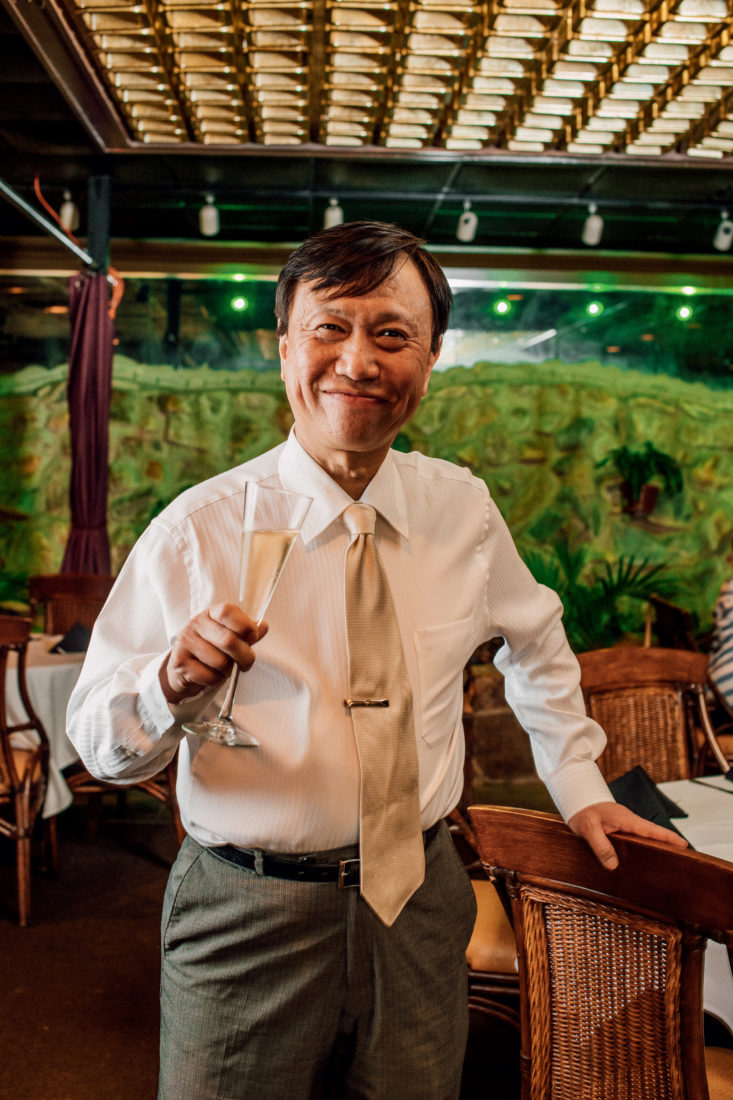
Photo: Denny Culbert
Lucky Palace proprietor Kuan Lim.
Born in Kuala Lumpur, Malaysia, Lim landed in northwestern Louisiana twenty-one years ago. He had followed his older sister to Southern Illinois Universi-
ty in Carbondale, where he studied mechanical engineering and met the Taiwanese woman who became his wife. They made plans to buy a restaurant together in San Antonio, Texas. Instead, on the drive west, Kuan and Evelyn Lim stopped in Bossier City to play blackjack and stayed.
They opened Lucky Palace in the summer of 1997, in what was then a Ramada Inn, serving a Chinese menu that was heavy on egg rolls, egg drop soup, sweet and sour pork, and egg foo yong. (Thick with chewy bits of roasted pork, egg foo yong remains a lunchtime favorite. Ditto shrimp toast, mounded on thick husks.) Back then, Lucky Palace poured sweet tea and sweeter white zinfandel.
That changed when a casino manager brought in a group of mainland Chinese high rollers. Their escort took Lim aside after dinner. Maybe you should start stocking different wines, he told him. Whales like to drink big, tannic Napa Valley wines and throw money around. Lim began there, before graduating to Burgundy and, then, to Champagne.
He taught himself to taste wine. Each morning before work, Lim tucked into a recliner to read Bacchus & Me by Jay McInerney or Kevin Zraly’s Windows on the World tasting guide. He traveled to James Beard Foundation benefits to learn how chefs paired food and wine. Over platters of tempura-fried lobster tails swaddled in green curry sauce, he courted favor with wine distributors and, eventually, winemakers who trekked here to patronize a curious white-tablecloth Chinese restaurant with the deepest restaurant cellar in the northern half of the state, and returned to test their own palates against his.
Lim learned to recognize the difference between old-world and new-world wines. He graduated to blind tasting bottles, noting which wines were made with grapes raised in volcanic soil and which were born of limestone. To better complement his wines, he expanded the menu to include thought experiments such as fried chicken with truffle salt and lamb with Malaysian curry. Today, he employs two chefs. Gerardo Orta Marcial and Alberto Orta Marcial, brothers and natives of San Luis Potosí in north-central Mexico, learned to cook Chinese food in Dallas. Here, they work six woks, stir-frying and deep-frying alligator with garlic sauce and razor clams with fermented black bean sauce.
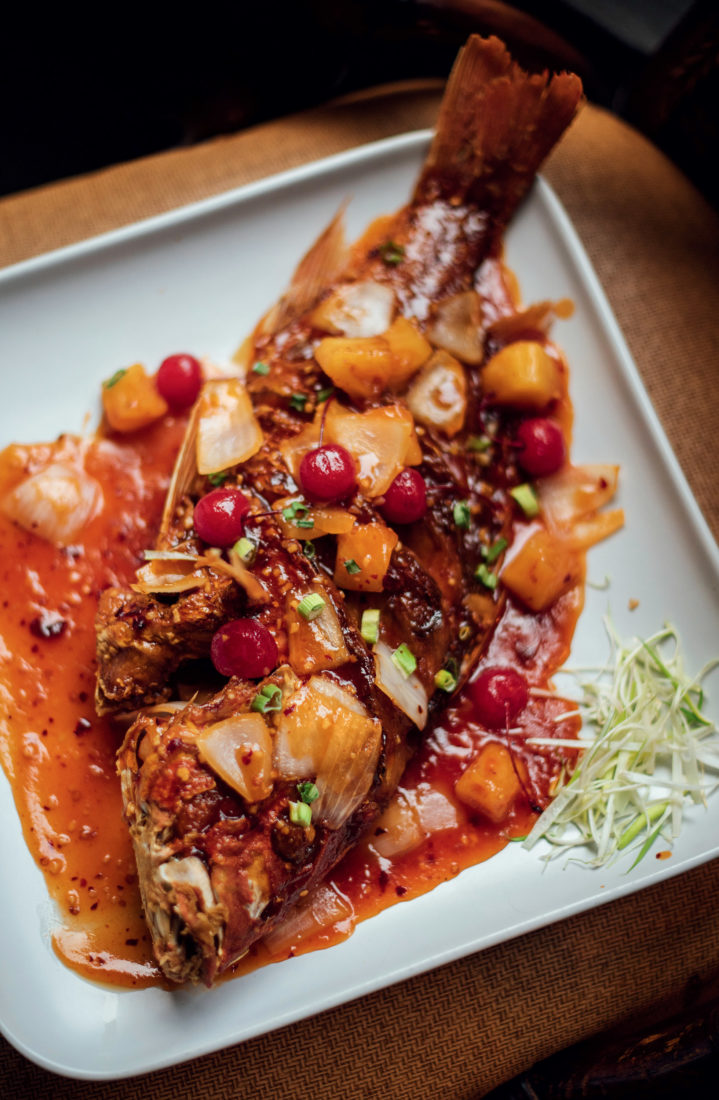
Photo: Denny Culbert
Grilled red snapper.
Over the years, Lim has amassed an extraordinary trove of wine, now stored higgledy-piggledy in wire racks, on credenzas, and in black box coolers stashed throughout the restaurant. Doctors and lawyers proved core customers. When local judges filed papers for reelection, they listed Lucky Palace as their campaign headquarters. Just off the lobby of the Bossier Inn and Suites, a community of Chinese food lovers and oenophiles coalesced.
The last few years have tested Kuan Lim. His wife divorced him and moved with their son to New York City. In the spring of 2016, his doctor diagnosed cancer. Aggressive chemotherapy and a prolonged hospital stay followed. To arrest a spreading infection, surgeons amputated his right leg above the knee. At times he despaired, worrying whether chemotherapy would ruin his palate, believing that if he couldn’t taste the wine he had come to love, his life was not worth living.
His community staged fund-raisers. His colleague Holly Lim (no relation) took charge of the dining room. While Kuan Lim recovered at home, regulars called his cell for wine recommendations. Dave Bridges, a longtime friend, calls this Lim’s “Ghost Sommelier” phase, when he was not physically present but managed to remain a voice in the ear of his regulars, touting ripe and flinty Burgundies and yeasty Champagnes with steely spines.
In June 2017, Lim returned to Lucky Palace. And to his regulars. By force of will and study, he had built a restaurant and wine program in a rent-by-the-week hotel that subverted expectations and set new standards. And he couldn’t abide losing it.
Lim now travels the dining room with a cane and a prosthesis, clanking as he moves from table to table, talking about the promise of the next vintage, extolling the virtues of the duck roasted by Gerardo and Alberto and served with steamed buns called bao. With each hitched step he takes, with each diner he greets, Lim reminds all of the varying and confounding definitions of who is lucky and what makes a palace.


